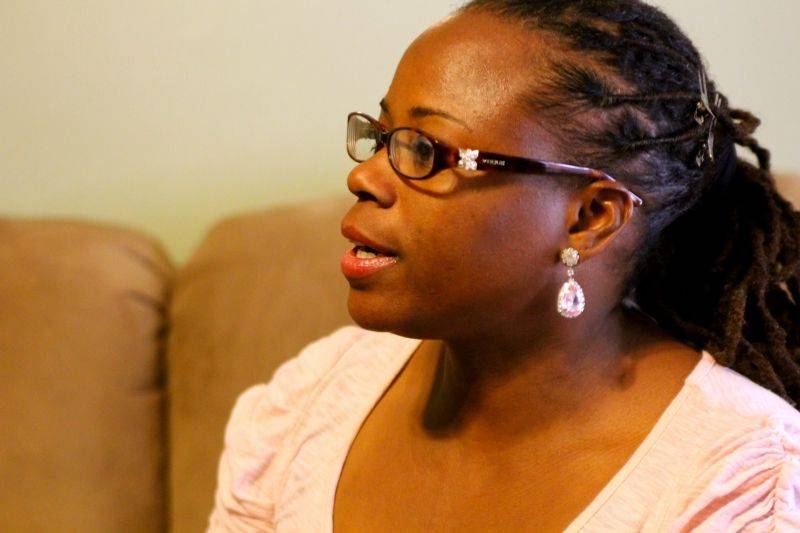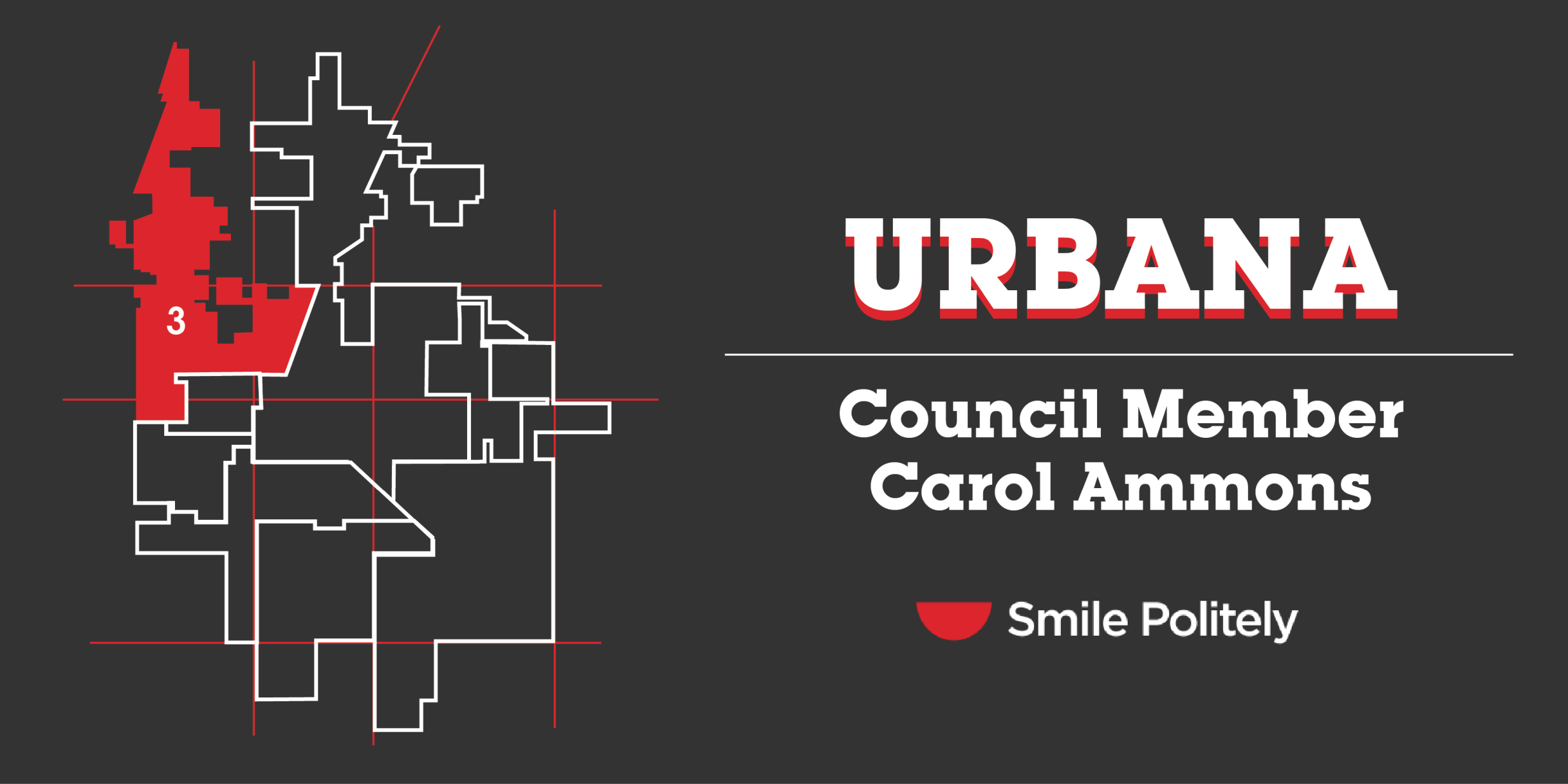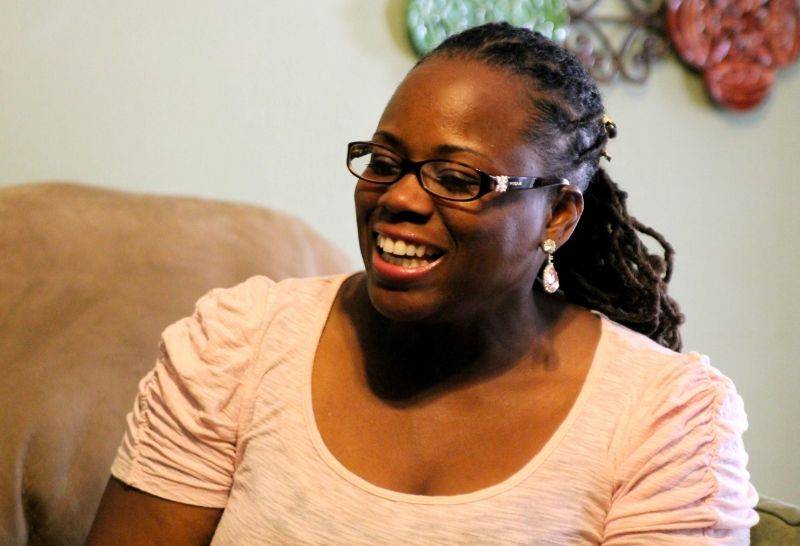It’s a busy time to be Carol Ammons. She’s a few months into her term as a member of the Urbana City Council, having recently resigned as director of the Independent Media Center. And a few weeks ago, she announced her candidacy for the 103rd District of the Illinois House of Representatives. Amidst all these changes, she agreed to chat with me in her home about her political background and her views on issues currently facing Urbana.
Question 1.
SP: What brought you to Champaign-Urbana?
Ammons: I grew up southwest of Chicago in Will County, which is the Joliet area. My mother lived in Rantoul. I was married once before; when I divorced my first husband, I moved down here to live at my mother’s house to start over. I had every intention of going back north, but I then I never actually did… This community kind of grows on you a bit. I met Aaron, who’s my current husband, and we moved to Urbana. We’ve been here ever since.
Question 2.
SP: How did you get introduced to politics?
Ammons: Politics has always been something I was interested in my. When I was much younger, my mother said, “You are always debating and arguing something. You should certainly make money doing that.” I wanted to go to Congress when I was 13. I was always interested in how government works. Reading policy, researching politics—that would be boring for most people, but I can watch public access television and be engaged it the discussion, which is probably a little weird. But to me, it’s interesting to look at how cities work and how governments work.
As far as my introduction to working in politics, that happened in a class I was in when I entered college. While doing a survey project for that class, I learned about Carol Mosey Braun. And so I began to some neighborhood organizing and canvasing for her campaign.
I was born in the 70’s, so I’m on the heels of the Black Power movement, Angela Davis is an all-time hero to me. Maxine Waters, from California, Carol Mosley Braun, Cynthia McKinley… if you understand those people, then you understand what kind of person I am, and how I drive from the base needs of those who are less represented in our society. I think all of my political heroes have been people who have really driven for change at the base level.

Question 3.
SP: How you would characterize the difference between Champaign and Urbana?
Ammons: It’s interesting how we’re always described as twins, like when people say we’re sister cities. We’re definitely fraternal twins, if that’s the case. We’re not exactly alike. Urbana has a form of government that is much different from Champaign’s; it’s very open and democratic, inclusive, and engages the council members. Really, the council members do a lot of the directing of the city. In Champaign, there’s a city manager form of government, which is really driven by the staff and city manager. So there is a real dichotomy between the two cities.
We have a very art-driven community in Urbana. It’s eclectic, in some ways, which isn’t good or bad. Champaign has more corporate representation. A lot of the businesses in Champaign are corporate. We have more localized, incubator, small kinds of creative business. If you go down main street in Urbana, you’ll see a lot of creativity in the type of businesses that are there. That’s a result of the political differences between the two citites.
Question 4.
SP: During your time in the city council, what political or local issues have captured your attention the most?
Ammons: I’ve only been on the council since May, though of course I did 5 ½ years on the County Board. In that role, some of the things that really captured my attention were environmental issues that I didn’t have a lot of background in prior. Like farms, working with wind farm ordinances, wind farm companies, environmentalists who are concerned with windfarms, or the dangers to animals that windfarms cause. Those are things that I think I’ve become educated about that I wasn’t prior to being a part of the County Board.
Since joining the City Council, the major issue has been property taxes and Carle Hospital. The legislature passed a measure allowing Carle to claim exempt status, which has hurt the City of Urbana and other taxing bodies. So we’re trying to entertain raising our sales tax to make up the revenue and prevent raising property taxes as a result. Which is a very big issue.
Sales tax affects people on different levels in different ways. So for a person like me to say “yes” to a sales tax is almost out or character. That’s a big issue that we’re facing right now.
I’ve also received two hate mail letters since I’ve been on the City Council. That’s been interesting.
Question 5.
SP: Do you want to describe what those were like?
Ammons: They were interesting. The first piece was picked up by my husband. Somebody had cut out an article I wasn’t even in and scribbled across it that they didn’t agree with positions I’ve held.
SP: What positions?
Ammons: I’m trying to remember. It was a little convoluted. It was clear they didn’t agree with me on general matters. They wrote it in a black marker, and there was no return address.
SP: So you can’t even contact them.
Ammons: Right. And then there was another one a few weeks after that, in a similar framework, with no return address, upset with me for not turning a fraternity house into a landmark. Sometimes people completely agree or disagree or disagree with you, but that’s the nature of public office. My husband suggested that I turn it into the police department, and the police said I should come give a statement, but I’m just thought, “What am I going to say, other than they sent me these letters?” I think those things just come with the territory.
Question 6.
SP: Some people call C-U a transient community. Do you see it that way, and if so, how does that influence your relationship with the community?
Ammons: I do a lot of work with the university, so I work with student organizations all of the time, for instance in getting them to help me with some public policy issue, or find another solution that we haven’t thought about. Students are really an intregal part of my own personal work. I respect the resources of the university. I also believe the university hasn’t yet done its best in terms of reaching out to students of color at the University of Illinois. I think the new chancellor is interested in that, and I’ve seen a lot of work they’ve tried to do on that matter, but I think climate still plays a big role in people’s comfort levels in this community. We still have a very divided, segregated community, and the only place it’s not that way to such an extent is on the university campus. If you took at the campus, you’d see a very different picture from what it’s like in the cities of C-U. We have a lot of progress we could make in relation to that.
Question 7.
SP: Has there ever been a time on the city council when you thought the community was really against what you voted for?
Ammons: I think there was one. There is a community in part of my district that’s across Lincoln Avenue that is the oldest subdivision in Urbana. It’s called the Dr. Ellis Subdivision. It’s primarily an African-American community, and its infrastructure, especially the sewer system, consistently backs up in the homes of people in the subvision. This issue started before I came on the council. I don’t think we did what the members of that community really, really wanted us to do; we had to come up with a concession. I don’t think anyone’s angry with me, but it wasn’t what they wanted.
SP: What was the decision?
Ammons: We decided on a financial rebate to the homeowners, who had to dig up their yards to replace their sewer pipes. If they had to tear up the sidewalk side, the city would pay 100%, but not for their yards. So it wasn’t 100% overall. They wanted the entire portion to be paid for because they thought the pipes weren’t great quality when they were installed. We couldn’t get that far, so the compromise was to pay for the right away and have the homeowner pay for the rest of it. We’re doing a study with some urban planning students this fall to see if there’s another solution.
Question 8.
SP: Are there particular places you really like to go in C-U when you’re relaxing, such as businesses or public spaces?
Ammons: I like to go to Meadowbrook Park. I like to bike ride. And I like going to the gym… once I get there. I like the parks, and the Japanese Garden on South Lincoln.
Question 9.
SP: If someone in the Illinois State Senate were to sponsor a bill to repeal the new Conceal and Carry law, would you support it?
Ammons: Yes. I think Conceal and Carry is a very dangerous law. We’ve seen the dangers in other communities. Unfortunately, regular citizens are not trained to deescalate situations. They’re not trained to deal with really quick deicison-making in a rational way. We’ve seen people shoot unnecessarily. “I thought” is always the response after the fact. Conceal and Carry is too much responsibility to put in the hands of individuals who are not always rationale. This is especially the case when you’re confronted by people from another community from you, especially when you’re influenced by the dominant narrative of media. People make decisions based on their perceptions, not what actually is. I have a permit myself, and I’ve had it for years. I don’t own a weapon, but I could. I think that giving people that much authority comes with a lot of responsibility.
Question 10.
SP: Would it be appropriate for any state of the union to fly the confederate flag?
Ammons: That’s an interesting question. I have an older son who’s 18 and who is attending Jackson State University right now. We often go to the South, which I enjoy. It’s a very different space. When we’re down there, we often see the confederate flag alongside the U.S. flag. And when it comes to African-American culture and history, neither flag has been very good for African-American people. For me, in my 40s, I don’t think the confederate flag conjures as much negative feeling as it conjured for me in my 20s. It doesn’t give me as much angst as seeing the U.S. flag flying coupled with lies and assaults against other nations.
Question 11.
SP: Thinking about education, do you think charter schools or voucher programs are the future of American education?
Ammons: Most of my children have had some experiences with homeschool. I think charter schools are a great addition to the education landscape. But I don’t think charter schools should be used in place of public schools. Public schools need additional resources and support. I don’t have the same opinion about chater schools now as I did 5 years ago because I’ve seen the conservative movement dismantle public education. That’s their agenda, to dismantle public education. I would be very leary of replacing public schools with charter schools because there’s very little oversight.
Question 12.
SP: If you could change something about how the city council operates, what would it be?
Ammons: Oh my God… cut the agenda. I haven’t figured out how to do that, though. I’ve only been there a few months. Urbana, for some odd reason, can’t get through a meeting before 10 p.m., which is beyond anything I’ve seen. That shouldn’t be the norm. It should only be for a major issue that we’re still operating at 10:30. I want people to be able to watch the beginning and ending of the meeting… but we haven’t gotten there yet. I’m sure they’ll like that comment.
Question 13.
SP: What national political issue do you think is most important right now?
Ammons: Right now I think the most important issue is the consistent attempts by America to engage in foreign wars. We’ve not been able to stay out of war for any length of time since the beginning of this country. We’re always involved in some kind of conflict. Instead of being peace makers—although we claim to be that—in reality we function as police of the world, and policing the world is a very dangerous business because it involves making everyone operate the way you want them to. That’s gotten us in more conflicts than we’d like, and therefore our national budget is completely out of control. The majority of our national revenue goes to the military budget. I’m hoping President Obama and Congress do not engage in another war.
Question 14.
SP: What do you think is the most important local political issue?
Ammons: For Urbana, maintaining adequate city services with the economic downturn. Can the sales tax actually maintain our services at the level they actually are? That’s our main question right now.
Question 15.
SP: Finally, do you think Urbana is changing in positive ways as a community?
Ammons: I think so. I think Urbana is very conscious of its environmental impact. Urbana is trying to be one of the most environmentally-friendly biking communities, it’s involved in retrofitting buildings, things like that. Those are positive changes.
Check out part 1 of the series with Champaign Mayor Don Gerard. Stay tuned for more installments in the coming weeks.









